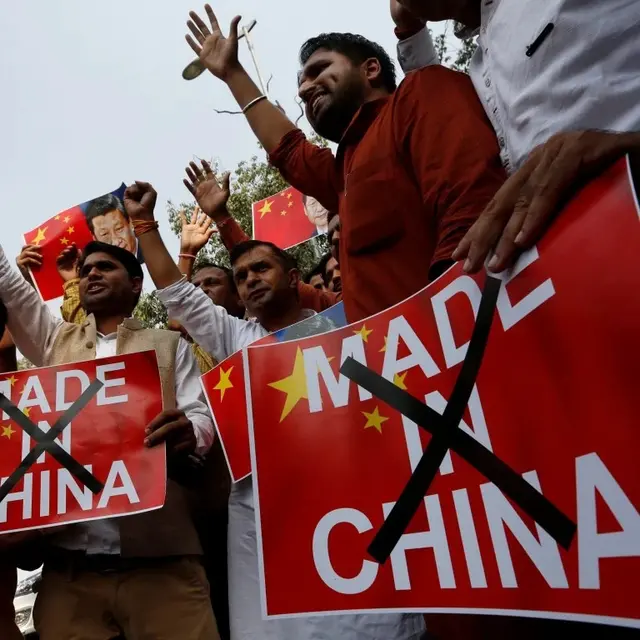Experts warned India of suffering great losses if it turns back on China, especially when many Indians have boycotted China after a border clash.
The death of 20 soldiers in a disputed border area with China in the Galwan Valley region quickly sparked a backlash throughout India. In Ahmedabad, people threw Chinese-made TVs off the balcony, while traders in the capital New Delhi burned Chinese goods on the streets.
The Indian government did not explicitly state its intention to boycott. However, state governments, along with some state-owned companies, were said to be required to postpone new contracts with Chinese companies. On June 22, Maharashtra state authorities announced that they were reviewing contracts with three Chinese companies, totalling more than 600 million USD.
Bilateral trade between China and India has been declining by 15% since fiscal 2018. India's consideration of imposing additional taxes and anti-dumping duties on imports from China, along with a wave of boycott, is said to worsen economic relations between the two countries, putting India at a disadvantage.
The first reason comes from the fact that China is India's second-largest trading partner after the US. The world's second-largest economy accounts for nearly 12% of India's imports, spanning all commodities such as chemicals, automotive components, consumer electronics and pharmaceuticals.
China meets at least 70% of India's drug distribution needs, said Sudarshan Jain, Secretary-General of the Indian Pharmaceutical Alliance. Although India has announced a new policy for more autonomy in the pharmaceutical industry, Jain explained that this goal takes time.
The smartphone sector, which is booming in India, also heavily depends on Chinese low-cost producers, which have the largest market share in the local market. Besides, most Indian consumer electronics manufacturers say they will be paralyzed if they cannot import important intermediaries from China.
"We are not worried about finished goods, but almost all economies in the world imports key components from China, such as air compressors," said B Thiagrajan, chief executive officer of Blue Star, an Indian manufacturer of air conditioners and air purifiers.
Thiagrajan added that they will take a long time to reset local supply chains. Moreover, there are only a few alternative suppliers of certain imported products.
Cooperation between China and India in recent years has become increasingly close, especially in the field of technology. Chinese corporations, including Alibaba and Tencent, have poured billions of USD into Indian startups such as Zomato, Paytm, Big Basket and Ola.
There have been more than 90 Chinese investments in Indian startups, most made in the last 5 years. 18 of 30 technology startups worth over 1 billion USD have one Chinese investor, said Amit Bhandari, an analyst at Gateway House in Mumbai.
Credit rating and research firm Acuite recently said India's domestic manufacturing sector could replace up to 25% of total imports from China, helping to reduce more than 8 billion USD in import costs per year.
However, the Indian government is said to be concerned about serious consequences for the economy if it boycotts Chinese goods, especially during the current severe recession. Meanwhile, China seems more comfortable because India accounts for only 3% of its exports.
So far, China has not reacted harshly to the border clash, while the rage in India is escalating. However, a recent editorial on the Global Times of the People’s Daily, the official organ of the Communist Party of China, warned that Beijing's restraint does not mean weakness.
“It would be extremely dangerous for India to allow anti-China groups to stir public opinion, thus escalating tensions,” the newspaper wrote, adding that New Delhi should instead focus on "economic recovery".
(ASIA PACIFIC DAILY)
 简体中文
简体中文





